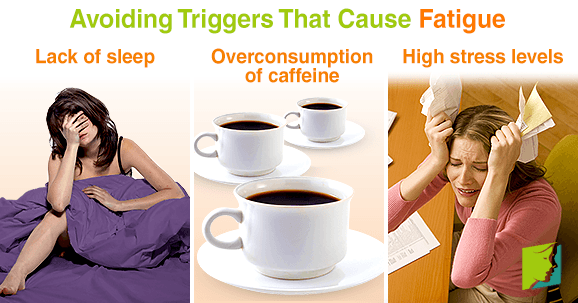Fatigue affects nearly everyone, and can be caused by many different things. The causes can be divided into three main groups: medical, psychological, and lifestyle. Medical causes of fatigue could be anything from pregnancy to thyroid disorder. Psychological causes of fatigue include depression and grief. Finally, lifestyle causes of fatigue include lack of sleep, overwork, etc. Some of these triggers are unavoidable if they are medical or emotionally induced, but some are preventable. This list features some helpful ways to avoid triggers and healthy ways to manage fatigue.
Triggers
As previously mentioned, there are many triggers of fatigue, ranging from lifestyle to psychological causes.
Lifestyle triggers
Typical fatigue lifestyle triggers include:
Lack of sleep. Sleep disorders can make you foggy and irritable. They affect your sex life, concentration at work, and your self-image.
Overconsumption of caffeine. A cup of coffee a day seems to be safe for most adults. However, more than four cups a day can cause unpleasant side effects, including fatigue over the long-term.
High stress levels. Stress is a common response to specific situations, but there are some warning symptoms of high stress, such as memory problems, difficulty concentrating, and extreme fatigue.
Causes
Psychological causes
Fatigue is a common symptom during menopause, and it is closely related to emotional issues, such as:
Anxiety. Anxiety and the worry it brings can cause high levels of fatigue and leave you feeling weak.
Depression. This symptom affects your sleep cycle. A woman may not realize that her fatigue is due to depression, especially during menopause.
Medical causes
Finally, medical triggers of fatigue include conditions like thyroid disorders, flu, chronic fatigue syndrome, hormone imbalance, heart disease, and pregnancy. These triggers are out of your control, but can still be managed. Typically, treating the underlying disorder will also relieve fatigue.
How to Treat Fatigue
Fatigue is an inevitable part of life. Fortunately, there are a few things to do to combat fatigue. They include:
- Exercise often (i,e.,at least 30 minutes of aerobic exercise per day)
- Get plenty of sleep
- Try to reduce stress
- Eat frequent healthy meals and snacks (every three to four hours) to maintain energy
The above treatment options are for fatigue if caused by lifestyle triggers. In the case of medical and psychological causes for fatigue, seeking medical attention is recommended to help treat this symptom. Prescription medications are an option to help treat fatigue caused by depression or anxiety.
Fatigue is an inconvenient and bothersome symptom that everyone experiences on a daily basis to some degree. Whether it is induced by lifestyle triggers, medical or psychological causes, there are ways to prevent and manage them. Avoiding lifestyle triggers like insufficient sleep and poor diet are the simplest ways to prevent feeling fatigued. Incorporating easy things like regular exercise, healthy eating, and reducing stress into your life can combat fatigue.
Sources
- Better Health Channel. (2011). Fatigue. Retrieved July 15, 2014 from http://www.betterhealth.vic.gov.au/bhcv2/bhcarticles.nsf/pages/Fatigue_explained
- Michell. K. (2012). Depression and Fatigue: A Vicious Cycle. Retrieved July 16, 2014 from http://www.healthline.com/health/depression/fatigue
- National Health Service. (2013). Why am I tired all the time? - Live Well. Retrieved July 15, 2014 from http://www.nlm.nih.gov/medlineplus/fatigue.html
- National Health Service UK. (2013). Self-help tips to fight fatigue - Live Well. Retrieved July 15, 2014 from http://www.nhs.uk/Livewell/tiredness-and-fatigue/Pages/self-help-energy-tips.aspx
- National Institutes of Health. (2014). Fatigue: MedlinePlus. Retrieved July 15, 2014 from http://www.nlm.nih.gov/medlineplus/fatigue.html


